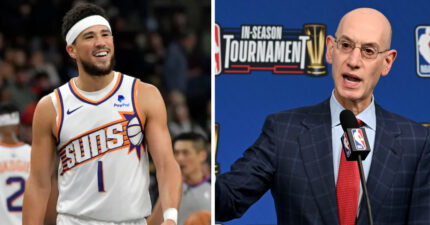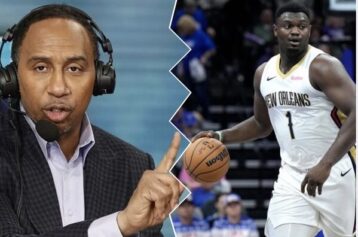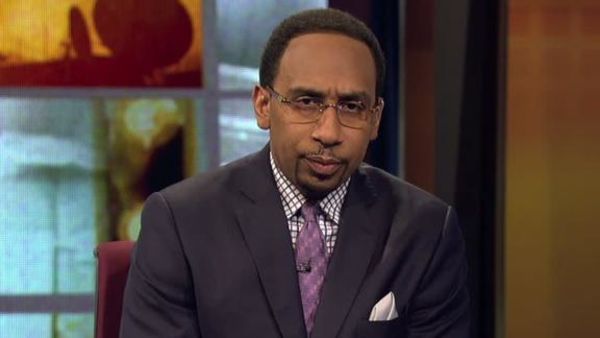Days off between NBA Finals games means the talking head shows need to work a little harder to fill segments when there are no games to react to. On “First Take” Stephen A. Smith and JJ Redick discussed comments made by NBA commissioner Adam Silver about the possibility of reducing the 82-game schedule. Smith, who cut his teeth as an NBA journalist in the 1990s, isn’t buying the idea of a reduced season.
“Eighty-two games being too much,” said Smith. “I don’t buy that.”
Of course Smith uses the faulty logic of it’s what the league has always done, the financial implications, and the players from prior eras having to play 82 games. It’s an archaic, disingenuous and dangerous way of looking at things.
The idea of a reduction in the 82-game schedule comes from the player injuries and the declining interest in the NBA regular season. There are just too many games to sustain consistent interest from October to April for the casual sports fan.
Part of the problem is Silver talks out of both sides of his mouth on the issue. Understandably so, as he works for the 30 NBA governors and the entire revenue structure is based on the 82-game schedule.
“As I have said before, what we don’t see is increased numbers of injuries as the season goes on. It’s not as if because of fatigue over the course of a season, you see more injuries. We do see a connection between actual fatigue, for example, from back-to-backs or three in a row. We think that potentially can lead to more injuries,” Silver said at a news conference last week.
“I think the way we are trying to look at it now is instead of reducing the number of games, we are thinking from a competitive standpoint, is there a way to improve what, to many people, is a long regular season.”
What sports scientists and sports medicine people has Silver and the league spoken to on this matter? Are they available for questioning by the media?
I have independently spoken to sports scientists, trainers and sports medicine professionals over the last two years. They all agree an 82-game regular season is too taxing a load on the body. Two physical loads (games) over a seven day period is the consensus by that informal group.
The difference between 82 games today and the same amount in the 2010s, 2000s, and 1990s is the taxing nature of the game. The average possessions per game in an NBA game in the three decades prior to this one was 94. In this decade the average amount of possessions per game is 99.82 and climbing.
The average amount of three point attempts per game in the three decades prior was 16.7. In this decade the average three point attempts per game is 34.7 and also climbing.
What that means is, there is more ground a player has to cover now in an NBA game than ever before. In eras past teams ran a single action on offense and played from the post out. Even the least imaginative offensive teams in this era run multiple actions.
The game has evolved and the league needs to evolve as well, or face irrelevance. Redick understands that.
“The reality is the wear and tear on our bodies is very different than it was 20-30 years ago,” said Redick. “And that’s a fact.”
.@jj_redick revisits the conversation of a potential shortened NBA season.
"The reality is the wear and tear on our bodies is very different than it was 20-30 years ago and that's a fact." pic.twitter.com/QKLTtFq92i
— First Take (@FirstTake) June 7, 2022
The NBA currently has 30 teams, if each team plays the other 29 twice (home and away) that’s a 58-game season. If played over the same mid October to April time period, you wouldn’t have more than two games played by any team over a seven day period.
That schedule would allow for a recovery day, a strength training day, a practice day (coaches will be happy about this), a cardio and skill development day and film study. None of these things happen during the regular season. Players often strength train immediately following a game or the morning of, and there is essentially no practice during the regular season.
Of course there is the revenue piece. If NBA governors only have 29 home dates how will they ever make up the 12 home dates that get shaved off this reduced schedule?
This is where the proposed in-season tournament could come into play. The NBA could borrow from the UEFA Champions League tournament. That tournament could be sold separately and not a part of the regular season and playoff broadcast package the NBA sells. The naming rights for a title sponsor could fetch a large sum.
The point is, there are many ways to make up for the shortfall in revenue from chopping a total of 24 games off the schedule.
Of course the problem is a move like that represents change and human beings by and large are extremely resistant to change, especially sports fans.



